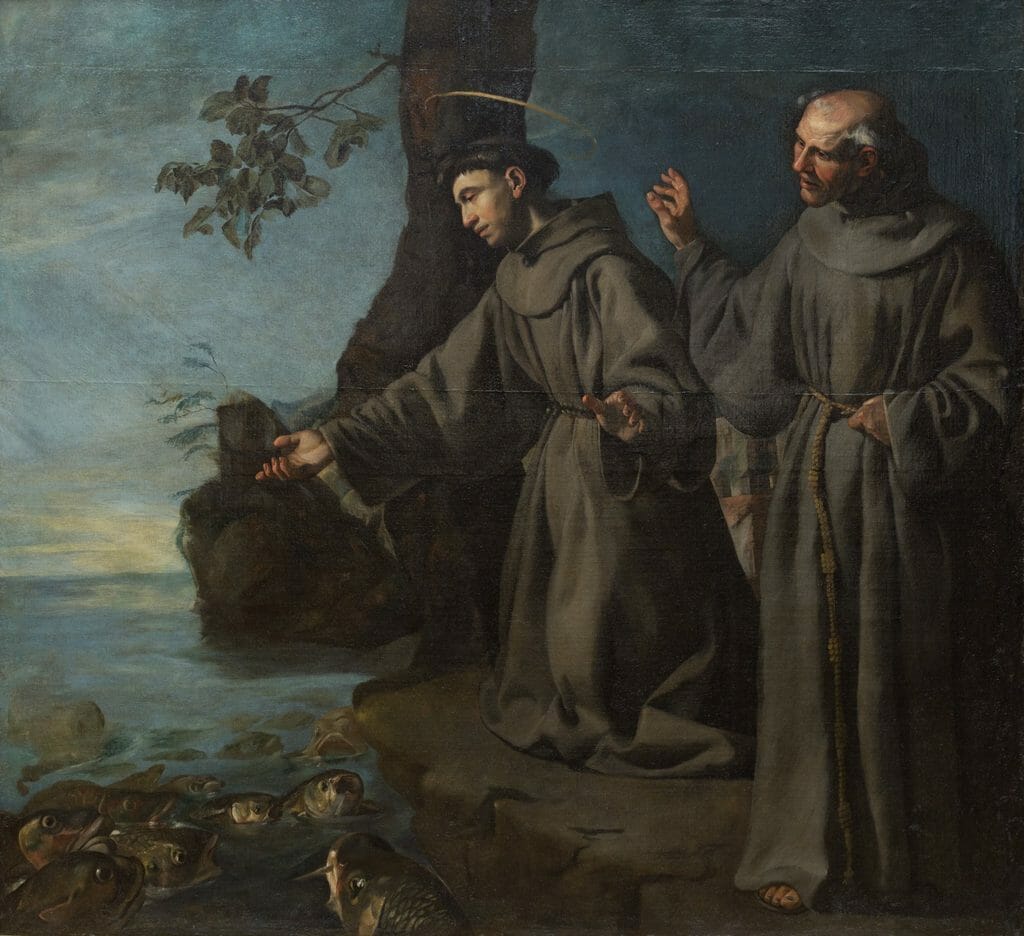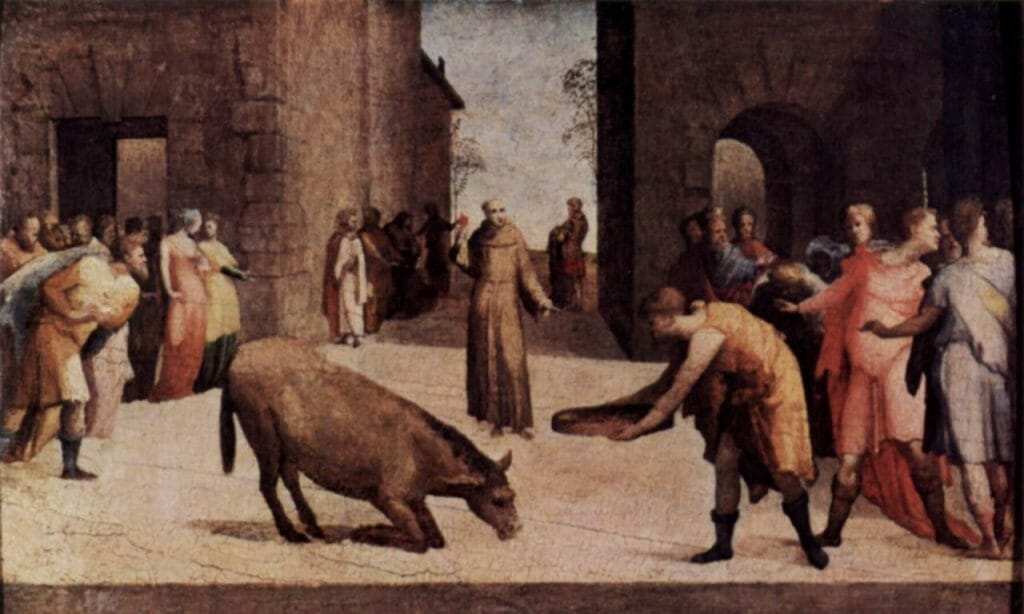Saint Anthony of Padua, The Thaumaturge, and Lover of all Creation
Saint Antony of Padua, was originally a Portuguese Augustinian priest, who joined the Franciscans in hopes to accomplish their goals as a missionary alongside Saint Francis. But a chronic illness barred him from accomplishing that purpose.
Saint Antony, the patron Saint of Lost things, people, and animals
His reputation for sanctity led him to be canonized by the Catholic Church shortly after his death, distinguishing himself as a theologian, mystic, ascetic and above all as a notable orator and great thaumaturge. António had a great culture, documented by the collection of written sermons he left, where it is evident that he was familiar with both religious literature and various aspects of the profane sciences, referring to classical authorities such as Pliny the Elder, Cicero, Seneca, Boethius, Galen, and Aristotle, among many others. His great knowledge made him one of the most respected figures in the Catholic Church of his time.
The Bollandists (Jesuits tellers of miracles of the saints) report more than 50 miracles of St. Anthony: controller of the forces of nature and ferocious animals; various resurrections; cures. He once turned a frog into a chicken and a chicken into a frog just to confuse heretics.
With his life, almost mythical, almost legendary, but passed down from generation to generation, and with the miracles attributed to him in good numbers, he became a thaumaturge of special importance.
Saint Anthony quotes
“God is Father of all things. His creatures are brothers and sisters.”
St. Anthony Preaches to the Fishes
One day, St. Anthony was in the Italian city of Rimini, where a good number of heretics lived.
St. Anthony preached to them, hoping to win them over to Christ. But they did not care to listen to his words. Despite his efforts, not everyone listened. Legend has it that one day, faced with deaf ears. So, Anthony decided to go to the river near the sea. He stood on the bank between the river and the sea. Since the heretics had refused to pay attention to him, Anthony invited the fishes to come near and listen to the word of God. That reads the traditional tale, got everyone’s attention.
Suddenly, a significant number of large and small fishes came before him, and, as they held their heads out of the water, they listened to his sermon. This they did peacefully and meekly. Then St. Anthony spoke in this way:
“My brother and sister fishes, you must thank your Creator with much gratitude because he has given you such a noble element for your dwelling place, as well as many kinds of food to eat. He has given you fins also, so you can roam the waters as you like!”
Some of the fishes began to open their mouths and nod their heads as a way of praising God. On seeing this, St. Anthony rejoiced and cried out:
“How blessed is the Creator! For the fishes give God more honor and praise than the heretics do.
The fishes may lack the gift of reason, but these creatures of the sea pay more attention to the words of Anthony than do these faithless heretics.”

Another story about Saint Antony of Padua
Saint Antony, meeting one day in Toulouse (France) to fight the errors of the enemies of the Holy Church, found himself in a struggle against one of the most tenacious Albigenses (a heretic sect according to the Church at that time).
The lengthy discussion ended up revolving around the theme of the Sacrament of the Eucharist. Finally, after great difficulties, the defender of the error was reduced to silence.
Finally, defeated but not converted, he resorted to an extreme argument, challenging the Saint:
— Let’s stop words, and let’s get to the facts. Suppose by some miracle, you can prove before all the people that the body of Christ is, in fact, present in the consecrated Host. In that case, I abjure heresy and submit myself to the yoke of the Faith.
“I accept the challenge,” replied St. Anthony at once, full of confidence in the omnipotence and mercy of the Divine Master.
— So, here’s what I propose: I have a mule in my house; after leaving it closed for three days without any food, I will bring it to this square.
First, then, I will offer her an abundant quantity of oats to eat in the presence of all. And you shall present here what you say is the body of Jesus Christ.
Suppose the hungry animal abandons food to run to this God who, according to your doctrine, must be worshiped by all creatures. In that case, I will believe with all my heart in the teaching of the Catholic Church.
On the appointed day, people came from all over, filling the square where the big test would occur. Catholics and heretics all were in an expectation that was easy to imagine. Nearby, in a chapel, Friar Antônio celebrated Holy Mass with an angelic fervor.
Then the Albigensian arrives, pulling his mule, while a partner brings the animal’s favorite food. Finally, a multitude of heretics escorts him, portentous of his victory.
At that moment, he leaves the Santo Antônio chapel, holding the ciborium with the Blessed Sacrament in his hands.
There is a profound silence. Then, addressing the mule, he cries out in a loud voice:
— In the name and by the power of your Creator, who, despite my unworthiness, I hold here really present in my hands, I command you, poor animal: come without delay to bow down with humility before Him.

Heretics must recognize that every creature renders submission to Jesus Christ, God the Creator, whom the Catholic priest has the honor of bringing down upon the altar!
At the same time, the Albigensian puts the pile of oats under the mouth of the hungry mule, urging her to eat.
Oh, wonder! Without paying any attention to the food offered to it, listening only to the voice of Friar Antônio, the animal bends down when it hears the name of Jesus Christ and then prostrates on its knees in front of the Sacrament of Life as if to adore it.
Because of this, Catholics burst into expressions of enthusiasm, while Albigensian is overwhelmed with stupor and confusion.
However, the mule owner keeps the word of honor given to St. Anthony, abjures heresy, and becomes a faithful son of the Church.
(P. Eugene Couet, Miracles Historiques du Saint Sacrément, 3rd ed., pp. 170-172)
(1) The Bollandist Society (French: Société des Bollandistes) is an association of scholars, philologists, and historians (originally all Jesuits, but now including non-Jesuits) who since the early seventeenth century in Christianity. Their most important publication has been the Acta Sanctorum (The Lives of the Saints). They are named after the Flemish Jesuit Jean Bollandus (1596–1665). [Wikipedia]
You may like to Read Saint Francis Other Animal stories here





